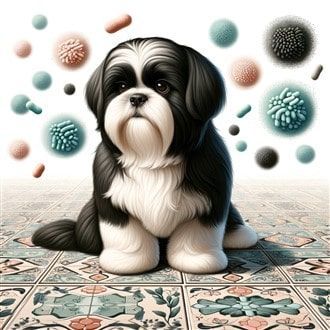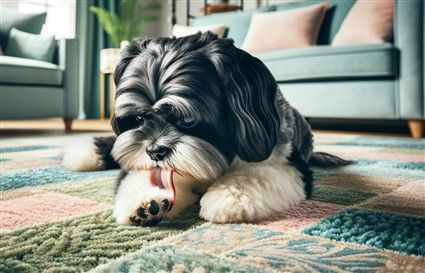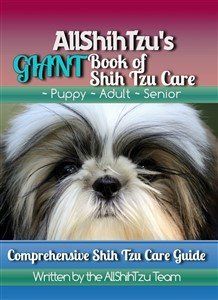Shih Tzu Self-Licking, Compulsive Licking Behavior
Overview
Shih Tzu dogs, like all canines, naturally groom themselves by licking their body. However, if a Shih Tzu obsessively licks themselves, it can lead to several complications including irritation and hot spots. In cases of continual compulsive licking, lick granuloma may develop, which is a condition that occurs when there is self-inflicted damage to the skin.
The top reasons for a Shih Tzu licking themselves includes allergies, boredom, stress, skin yeast infections, and dry skin. This section will cover symptoms of excessive licking, details of all common causes, at-home remedies and signs that a vet visit is in order.
Please note: AllShihTzu is reader-supported, and some of the product suggestions on this page are affiliate links. As an Amazon Associate we earn from qualifying purchases. This is at no extra cost to you and helps keep this site running.
Also please note: The issues of licking people and licking objects can now be found under Related Articles.
Clinical Signs of Excessive Self-Licking
If a Shih Tzu excessively licks their paws or other areas on their body, this constant friction can cause a range of problems including:
- Sores: Skin can become raw, resulting in tender, circular sores.
- Hot Spots: Also known as pyotraumatic dermatitis, this condition is type of infection on the skin and is a frequent outcome of self-inflicted skin damage.
- Irritation: This may include swelling, redness, or other signs of irritation.
- Bleeding: Continual licking can cause the skin to crack, leading to further licking of the wounds and exacerbating the issue.
- Bacterial Infection: Broken skin is prone to infection, indicated by redness, swelling, discharge, and soreness.
- Hair Loss: Prolonged licking often results in hair loss in the affected areas.
Please note: Many Shih Tzu dogs may lick lick themselves without showing the above signs, possibly due to early stages of a licking issue or infrequent licking.
Lick Granuloma: An Overview
Lick granuloma, medically known as acral lick dermatitis, is a skin disorder commonly seen in dogs, including the Shih Tzu breed. It is characterized by a dog excessively licking a particular area, usually a limb, leading to skin damage, inflammation, and sometimes chronic sores.
Signs: Lick granuloma goes beyond the normal signs of self-licking, and includes these more serious aspects:
- Persistent licking at a specific spot, typically on a limb.
- A raised, thickened, hairless area on the skin that appears red, raw, or ulcerated.
- Possible presence of a lesion that does not heal easily.
- Signs of discomfort or pain in the affected area.
Causes: Because lick granuloma is a result of self-licking, most of the common underlying issues are the same:
- Behavioral Issues: Stress, anxiety, boredom, or compulsive behavior can lead to excessive licking.
- Environmental Factors: Changes in a dog’s environment or routine can contribute to stress and subsequent licking.
- Health Conditions: Underlying health issues such as allergies, infections, joint pain, or nerve damage can initiate the behavior.
Treatments:
- Address Underlying Medical Issues: Consulting a veterinarian to identify and treat any underlying medical problems is crucial.
- Behavior Modification: Engaging in activities that reduce stress and boredom, like increased exercise, playtime, and mental stimulation, can be beneficial. Tips are below under ‘Boredom or Stress’
- Consistent Routine and Calm Environment: Maintaining a stable routine and providing a calm living environment can help alleviate underlying stress or anxiety contributing to the behavior. Tips are below under ‘Boredom or Stress’.
- Physical Barriers: Using bandages, protective clothing, or Elizabethan collars to prevent access to the area.
- Medications: In some cases, anti-inflammatory, anti-anxiety, or other specific medications may be prescribed by a veterinarian..
- Laser treatment: This is sometimes used in cases of severe lick granuloma or persistent cases that haven't responded to more conventional treatments. This uses therapeutic lasers to promote healing and reduce inflammation. It's a non-invasive, painless procedure where specific wavelengths of light are applied to the affected area, encouraging tissue regeneration and pain relief. The number of sessions required varies, but each is typically just a few minutes.
- Topical Treatments: Use of medicated creams or sprays to soothe and heal the affected area, while preventing infection. Read on for more possible reasons for licking, or jump down to Treatment for Itchy, Irritated Skin.
It's important to treat lick granuloma comprehensively, addressing both the physical and psychological aspects of the condition. Early intervention is key to preventing the progression of this often stubborn and challenging disorder.
Common Reasons a Shih Tzu Licks Themselves
#1 Allergies

What to know: Allergies in Shih Tzu dogs often present as itching. While a dog may experience itching over its entire body, the paws are particularly susceptible due to their accessibility. Other signs of allergies can include rashes, hot spots, chronic ear infections, and respiratory issues. These symptoms can vary in intensity and frequency.
What to do:
#1 Assess if veterinary care is needed, especially for severe allergies or skin that is cracked and bleeding (this may require antibiotics).
#2 Reduce allergens in your home:
- Regularly vacuum with a HEPA filter.
- Use HEPA filters in your air system or standalone air purifiers.
- Wet-dust your home.
- Wash all bedding in hot water.
- Use mite-proof coverings for mattresses and pillows.
- Keep windows closed after cleaning.
- Remove shoes upon entering the house.
- Clean your dog with hypo-allergenic grooming wipes and rinse their paws after outdoor activities. See also: How to Keep a Shih Tzu Clean.
- Limit outdoor exposure during high pollen times.
- Provide natural, grain-free food and avoid plastic bowls.
#3 Use a topical treatment to help relieve itch or irritation. Read on for more possible reasons for licking, or jump down to
Treatment for Itchy, Irritated Skin.
#2 Boredom or Stress

What to know: Compulsive self-licking can also be a coping mechanism for stress or boredom, potentially leading to lick granuloma, where constant licking results in open sores. Each dog has a unique threshold for these triggers. Stress can be due to various factors, including separation anxiety, a turbulent household, or significant family changes. Boredom is often seen in dogs that lack adequate attention or activity.
What to do:
#1 Assess for a stressful environment: In cases where a household is disorderly or unsettled, it's beneficial to establish a more tranquil environment. It can be helpful to provide your Shih Tzu with a personal area that's private yet not overly secluded, where they can retreat to, if they feel stressed or overstimulated. You may also wish to read: Indoor Playpens for Shih Tzu Dogs.
#2 Assess for separation anxiety:
Should your Shih Tzu have times of being home alone, it's important to address any underlying separation anxiety issues that may be present.
Some methods to help with this include creating a cozy area using an indoor playpen so a Shih Tzu does not roam an empty home, playing calming music, keeping on a TV, experimenting with a window vs non-window view, offering interactive toys and offering a companion toy like the
SmartPet Snuggle Puppy which mimics a real-friend with a calming heartbeat and body warmth.
#3 Assess for boredom: Keep your Shih Tzu engaged and physically active. Adhering to a routine that includes at least two daily walks, each lasting 20 minutes or more, along with playtime activities like fetch, is recommended. Involve your Shih Tzu in your daily tasks and errands whenever feasible, to provide further stimulation and bonding opportunities. See also:
The Best Toys for a Shih Tzu, which includes interaction toys, for games you can play with your little guy or gal.
#4 Use a topical treatment to help relieve irritation: Even in cases where self-licking didn't initially stem from an irritation, the ongoing focus on the paws or other areas of the body can lead to discomfort. In such scenarios, it's advisable to use a topical spray or cream designed to alleviate any itching or irritation and facilitate healing of the affected area. Read on for more possible reasons for licking, or jump down to Treatment for Itchy, Irritated Skin.
#5 Professional veterinarian care, if needed: If the measures implemented at home fail to alleviate severe anxiety or stress in your Shih Tzu, seeking professional veterinary care is strongly recommended. In some cases, this may include the prescription of anti-anxiety medication to help manage their symptoms.
#3 Dry Skin

What do know: Dry skin with Shih Tzu dogs can be a prevalent issue year-round. In the winter, paw contact with cold surfaces can cause dry paws, and when this is combined with arid winter air, it can cause full-body dryness. This is also a common issue in the spring, as the aftermath of winter's harsh, dry air continues to affect a dog's skin. And in the summer, walking on warm or hot surfaces can cause dry skin and skin irritation.
What to do:
#1 In the Winter, Prevent Dry Air in the House: Though adding houseplants and leaving out bowls of water can help to some extent, the best way to prevent dry air in the house is to use humidifiers. Most home models are designed to take care of one room, so if you cannot cover your whole house, set one up near your Shih Tzu’s resting and sleeping area.
#2 Encourage Hydration: Lead your Shih Tzu to their water bowl regularly. Ensure the bowl is cleaned daily and always filled with fresh, cool, preferably filtered or spring water. Consider using a canine water fountain to encourage drinking, and always carry water when going out with your Shih Tzu.
#3 Use a topical treatment to protect paws, and relieve itch or irritation on the paws or full body:
Itchy dry paws can be protected and treated with paw wax or butters. Other dry areas of the body can be treated with specialty shampoos, sprays, or creams. Read on for more possible reasons for licking or jump down to
Treatment for Itchy, Irritated Skin.
#4 Skin Yeast Infection

What to know: Yeast infections can cause a Shih Tzu to lick themselves excessively, either as a primary issue or developing subsequently. Symptoms of a yeast infection include itching and a distinctive odor, which can range from a corn chip-like smell to sour or musty. In severe cases, it may lead to raised or crusty skin sores. Yeast infections can be on the paws or can be a full-body issue.
What to do:
#1 Consider Professional Veterinary Care: If you suspect your Shih Tzu has a yeast infection but are not sure, or if symptoms are severe, visit the veterinarian for diagnosis and treatment. You do not want to use an OTC medicated yeast treatment if it's not a yeast, as it can be very irritating to skin if it has nothing to treat. And in stubborn cases, an oral anti-fungal medication may be necessary.
#2 Home Treatment for Yeast Infection:
Treatment for skin yeast infections that make dogs lick themselves is different than treatments for other causes. Consider using an anti-fungal medicated shampoo to thoroughly treat the paws or full body. Shampoos containing 1% ketoconazole or a combination of coal tar, salicylic acid, and micronized sulfur, like
Veterinary Formula Clinical Care Antiseptic and Antifungal Medicated Shampoo, are effective. The shampoo treatment should be done twice per week, and left on to soak for 5 to 10 minutes. Continue treatment for a short period even after symptoms resolve.
#5 Other Possible Health Issues
Treatment for Itchy, Irritated Skin

Before we dive in, please remember:
Seek Veterinary Care for Severe Symptoms: If your Shih Tzu exhibits severe symptoms such as prolonged bleeding, deep sores, pain affecting movement, pus, extreme redness, or other signs of infection, immediate veterinary attention is necessary. These symptoms can indicate more serious health issues that require professional care.
Address Underlying Causes First: It's important to identify and address the root causes of the licking. This ensures the treatments are more effective and will provide long-lasting results.
Please note: AllShihTzu is reader-supported. Some links below are affiliate links, meaning we may earn a small commission on products through these, at no extra cost to you.
Here are 4 types of products that can help:
#1 A Specialty Shampoo:
#2 A Spray:
Non-medicated, all-natural: This is best for mild cases. Some ingredients like oatmeal can combat itch and other natural ingredients like almond oil, aloe vera or chamomile can help to moisturize. One non-medicated spray that may offer some relief is Oatmeal Conditioning Spray by John Paul Pets, which has 13 conditioning ingredients, most notably oatmeal protein, aloe and chamomile.
Medicated spray: For more severe cases, where the skin is extremely itchy or hot spots are very sensitive and painful, consider using a medicated spray. For this, we recommend Veterinary Formula's Clinical Care Hot Spot and Itch Relief Medicated Spray, which contains lidocaine to numb pain, hydrocortisone to reduce itching, and allantoin to moisturize the skin. Apply this spray twice a day for consistent relief, targeting the specific problem areas.
#3 A Cream:
Creams can be helpful for skin irritations, especially if there are sores on the tummy, hot spots on the body with thinning hair or red, swollen areas on the paws. This is best applied at night, right before your Shih Tzu is about to go to sleep. If you put it on the paws, try slipping a children's sock over the paw to help the cream stay in place as it soaks in. One cream that we like is Hot Spot Treatment by ResQ Organics, which also helps to treat mange, itchy skin, dry skin and wounds. It contains manuka honey and aloe.
#4 A Paw Wax:
Final Thoughts
Excessive self-licking in Shih Tzus can have a variety of causes, from allergies and dry skin to stress or underlying health conditions. Pinpointing the reason may take time, but recognizing the signs early and responding with the right care can help prevent long-term issues like lick granulomas.
With the a good treatment plan and a little patience, your Shih Tzu can get back to feeling comfortable again.
Shih Tzu Keeps Licking People - If your Shih Tzu just won't stop licking your fingers, hands or face, see why puppies and dogs do this and how to address it.
Shih Tzu Keeps Licking Objects - This covers the issue of compulsively licking furniture and other non-toy objects.
The Best Interactive Toys for a Shih Tzu - If you're looking for some great toys to help teach independent play or some ways for your sweetie to stay occupied when your focus is elsewhere, you'll love these finds.
Senior Shih Tzu Care - If your Shih Tzu is in the 8 year range, it's time to prepare for senior care. And if they are 10 years and older, it's vital to have these things in place. Great tips to ensure optimal well-being for the senior years.
Helpful Gadgets to Simplify Life with a Shih Tzu - A few smart tools can make a big difference. These fun little devices, tools and doodads make everyday life easier, and way more fun, for both you and your Shih Tzu.



